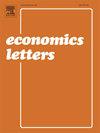Group size, member selection, and performance: Evidence from legislative elections in Brazil
IF 2.1
4区 经济学
Q2 ECONOMICS
引用次数: 0
Abstract
This paper provides empirical evidence on the causal effects of group size on member selection and performance. Using data from local legislative elections in Brazil in a difference-in-differences framework, I explore an electoral reform that reduced the maximum number of candidates allowed in coalitions disputing legislative seats. The reform did not change the number of candidates and parties in the election, which was possible because in municipalities affected by the new cap parties reorganized into 21% more coalitions than would be expected without the reform. I discuss how the heterogeneity of the candidates combined with the coalitions’ adjustment to the reform led to the election of city councilors who were 17% wealthier, on average. Although the reform achieved the goal of reducing campaign costs, which fell by 9%, the election of wealthier politicians was an unintended consequence that weakened the representation of economically disadvantaged groups in the legislative body.
求助全文
约1分钟内获得全文
求助全文
来源期刊

Economics Letters
ECONOMICS-
CiteScore
3.20
自引率
5.00%
发文量
348
审稿时长
30 days
期刊介绍:
Many economists today are concerned by the proliferation of journals and the concomitant labyrinth of research to be conquered in order to reach the specific information they require. To combat this tendency, Economics Letters has been conceived and designed outside the realm of the traditional economics journal. As a Letters Journal, it consists of concise communications (letters) that provide a means of rapid and efficient dissemination of new results, models and methods in all fields of economic research.
 求助内容:
求助内容: 应助结果提醒方式:
应助结果提醒方式:


